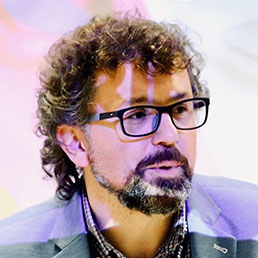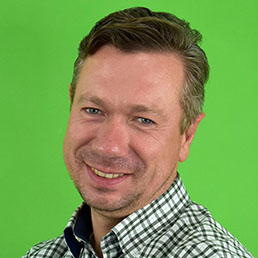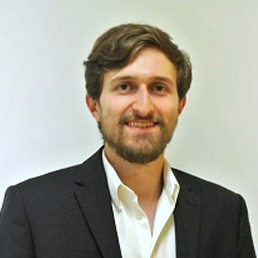Robots and autonomous machines are slowly, but surely, infiltrating human environment. Municipalities are testing self-driving cars and buses, governments and businesses are considering policing or delivering goods by drones, and scientists are working on increasingly complicated decision making algorithms for computers. These are very exciting advances in science and technology, however they also pose many ethics-related questions. How an autonomous car will make a decision in the face of a potential collision involving another vehicle and a group of school-children? Will machine learning lead to supremacy of AI over humans?
The third event in the HumanTech Meetings series, organized by SWPS University’s HumanTech Center for Social and Technological Innovation will focus on technological and ethical aspects of AI. The meeting will be hosted by Dr. Konrad Maj.
Lanuage of the event: English with translation into Polish.
Free admission. Registration required.
December 11
16:45-20:30
Warsaw
HumanTech Meetings
We live in an era of innovation, technological progress and digitalization. This current innovation drive may lead to unpredictable psychological and social outcomes. Therefore, it is crucial to establish collaborations between engineers, programmers, IT specialists and social scientists during initial phases of any new projects related to development of new technologies or services. Such collaborations may help to avoid mistakes and can support better development of new ideas.
The project is planned as a series of meetings, gathering academics and professionals from the technology sector from Poland and other countries. Each meeting will include two lectures, one delivered by a speaker from Poland and one presented by a guest from another country. The lectures will be followed by panel discussions, where panelists will represent different approaches to innovation and technology.
HumanTech Meetings is a project of SWPS University's Center for Innovation. The aim of the project is to initiate cooperation between the technology sector and social scientists to present different perspectives on phenomena such as Artificial Intelligence, machine learning, algorithms, robotics as well as virtual and augmented reality.
More information »
Lectures - Part 1
16:45 - 18:30
Lecture 1: AI Ethics in Regulatory Landscape (16:45-17:15)
Dr. Szymański will focus on the social perception of Artificial Intelligence (AI), its ethical implications, and he will discuss the landscape of ethical regulations related to AI. There are three models of regulation in the current approach to ethical AI: top-down regulation, bottom-up (self-regulation) and middle-out (top-down framework for self-regulation at different levels). Dr. Szymański will briefly characterize the most important AI regulatory initiatives and will mention the current status of AI ethical regulations in the European Union. He will present the main challenges associated with these regulations, such as algorithmic accountability, data bias, algorithmic bias, transparency, AI explicability, and AI governance and he will also indicate the ethical risks associated with these issues.

Dr. Sebastian Szymański – Philosopher specializing in ethics and practical ethics. His research interests focus on justice and ethical problems related to new technologies, in particular robotization and Artificial Intelligence. He teaches roboethics and ethics of new technologies at the Faculty of Artes Liberales and is a member of Laboratorium Techno-Humanistyki [Techno-Humanities Laboratory], at the University of Warsaw. He leads an ethics group in the expert team by the Ministry of Digital Affairs of the Republic of Poland, which is responsible for the development of the Polish Artificial Intelligence strategy. Additionally, he sits on the Digitization Council at the Ministry of Digital Affairs, where he heads its Artificial Intelligence team. His most recent publication is entitled Uzasadnienia teorii sprawiedliwości. Dziedzictwo Johna Rawlsa [Justification of the Theory of Justice. The Legacy of John Rawls] (published by Wydawnictwo Naukowe Scholar: 2018). Dr. Szymański is currently working on a book about AI ethics, which is scheduled for publication by Wydawnictwo Naukowe PWN in 2020.
Lecture 2: The Ethics of Artificial Intelligence: A Technological and Social Challenge (17:15-17:45)
The presentation will explore the issue of ethics in relation to Artificial Intelligence. Dr. Madai will give examples of areas where machine learning and artificial intelligence pose ethical challenges. Additionally, he will emphasize that applications of AI lead not only to technological, but also to social challenges. Dr. Madai will propose that AI can be used for the greater good of all people only, if we apply an interdisciplinary approach to its implementations.
Vince Madai, M.D., Ph.D. – Vince Madai is a senior medical AI researcher at Charité University Hospital Berlin and CSO at ai4medicine. He holds an M.D., a Ph.D. in Medical Neuroscience and an M.A. degree in Medical Ethics. Additionally, he has completed an Udacity Nanodegree in data science and analysis. His professional interests include AI-research, AI-ethics, data science, post-processing of neuroimaging and clinical research. He has been the scientific lead of the “Predictive Modelling in Medicine” research group at Charité as well as the Prediction2020 and the PRECISE4Q projects for the last two years. He is an expert in AI ethics, specializing in bias and upcoming regulations for AI products. Moreover, he is on the expert council of the Good Technology Collective (GTC) and Associate Editor of an interdisciplinary publication Delphi Journal. Since November 2017, he has been the main organizer of the “Machine Learning in Healthcare” meetup in Berlin.
1st panel discussion topic: The rights of humans and the rights of inteligent machines
Panellists

Judy Krysik, Ph.D., M.S.W. – is an Associate Professor and Director of the Center for Child Well-Being, in the School of Social Work at Arizona State University. She is the recipient of the 2019 Council on Social Work Education Award for Innovative Teaching in Social Work, and in 2017 was named Fellow of the Society for Social Work and Research. She is a member of the Executive Board of the African Institute of Child Studies with headquarters in Kenya, the National Association of Social Workers Ethics Committee, and Chair of the Governance Committee for the Children’s Museum of Phoenix. Her research interests include the prevention of child maltreatment among infants and toddlers, the efficacy of specialized court programs directed at children and families, and the practice of child protective services. The Center for Child Well-Being develops high-quality, customized training resources and is host of the National Children of Incarcerated Parents annual conference. She is the author of Research for Effective Social Work Practice (4th edition), and co-editor of the forthcoming book Children of Incarcerated Parents: Integrating Research into Best Practices and Policy.

Kamil Galicki, Ph.D. – Holds a doctorate in security science, in the discipline of social sciences. He specializes in the management of companies and issues of entrepreneurship, public funds law, security, systems, business continuity management, crisis management, and critical infrastructure. In 2003, he completed postgraduate studies in Internal Auditing of Public Administration. He is internal auditor certified by the commission appointed by the Minister of Finance of the Republic of Poland and a leading auditor of business continuity management systems BS 25999. He completed numerous seminars and training sessions on practical aspects of entity budget management, control and auditing. In 1996 he became a policeman and since 1998 he has been working for the Office for State Protection of the Republic of Poland (UOP). Recipient of numerous awards for his contributions to the service. From 2006 to 2010, he held various posts, including Director of Auxiliary Unit at the Internal Security Agency (ABW) and Deputy Director, and subsequently Director of Administration and Economic Office of the Internal Security Agency (ABW). From 2010 to 2014, he held the position of Deputy Director of the Government Centre for Security, where he supervised Divisions of Critical Infrastructure, Strategic Planning, Administration and Finance. Up to 2018, he was Rector’s Representative for Classified Information at Cardinal Stefan Wyszyński University.
Kuba Piwowar (panel moderator) – sociologist, analyst, member of the Polskiego Towarzystwa Badaczy Rynku i Opinii [Polish Association of Market and Opinion Researchers] (PTBRIO), co-organizer of conferences bridging business and technology. He holds a degree in Sociology form SWPS University and completed post-graduate Gender Studies at the Institute of Literary Research of the Polish Academy of Sciences (PAN), Art History at the Collegium Civitas and the Marketing Academy at the Wharton School of the University of Pennsylvania. Currently, he is a doctoral student at the Interdisciplinary Doctoral School at SWPS University, where at the Department of Cultural Studies, he is working on his doctorate on algorithmic exclusion. Since 2008, as a Google employee, Kuba has been helping Polish entrepreneurs to implement digital transformation in their companies.
Lectures - Part 2
18:45 - 20:30
Lecture 1: Programs Creating Programs: How AI Technology Impacts IT Professionals
Machine Learning technologies or broadly understood AI support the development and improvements of computer software. Currently, the job market in the IT industry is a typical ‘employee market’, forcing employers to constantly compete for best talent and specialists. This leads to a development of a specific organizational culture involving a creation of an attractive place of work for engineers. Will this trend change with a ubiquitous application of AI? Do employees in the technology sector feel threatened? The presenter will talk about practical applications of AI in organizations. The lecture will also show examples of changes happening in some companies and changing behavior of employees faced with technological developments.

Łukasz Bargiełowski – holds a Master’s degree in management from the Warsaw Management University. He also completed postgraduate studies in cybersecurity at the Warsaw School of Computer Science. He also is a certified Agile Service Manager/SCRUM Master. For over 14 years, he has been leading teams of engineers in technology companies. He helped to establish and develop Technical Centers in Warsaw, employing programmers and help desk engineers for clients such as Symantec and F5 Networks. In his professional career, he specializes in teaching communication skills for engineers, focusing on relationships with external clients. He often gets involved personally in solving client-related crisis situations. This allows him to closely observe the work of highly skilled technical experts, representing a cool and collected technical approach in confrontation with emotional clients dealing with a technical breakdown. His other interests include organizational culture in technology companies and its impact on employees and on the job market.
Lecture 2: Recent Advances in Natural Language Processing (NLP)
"Mastery of language affords one remarkable opportunities” (Alexandre Dumas). While the mastery of language has been solely owned by humans so far, this seems to be changing these days. Thanks to drastic improvements in the field of NLP, neural networks become better and better in understanding and generating language. This talk will introduce you to "Transfer Learning", a core technology behind modern NLP models that has empowered many of the recent breakthroughs. With two exemplary applications (Question Answering & Fake News Generation), we will demonstrate not only the remarkable opportunities of NLP models, but also the risks and responsibilities that arise from the use of this new technology.
Malte Pietsch – is Co-founder of deepset, where he bridges the gap between Natural Language Processing (NLP) research and industry, by providing open-source software and developing custom NLP models. He has developed NLP systems for diverse clients, such as Siemens, Airbus and Springer Nature. He is an active open-source contributor and creator of the NLP packages FARM and haystack, which are in line with his biggest interests these days, such as: Transfer Learning, Language Models and the application to Question Answering. He graduated with honors from the Technical University of Munich with a M.Sc. degree and conducted research at Carnegie Mellon University. Before founding deepset he worked as a data scientist for multiple startups.
2nd panel discussion topic: Communicating with machines in natural language
Panellists
Kamila Stepniowska – Owner at Ginger Tech, which is a boutique consultancy focusing on Business Development, Machine Learning & AI, and Education. Public speaker, former Training Program Manager at deepsense.io, former COO at Geek Girls Carrots (GGC), former Women Who Code Seattle Evangelist, Advisor at She’s Coding, and SheWorx Steering Committee member.
Rafał Małanyj – Creative and open-minded leader and manager with business development skills and technological background. His experience includes service and project management in corporate environments, business development, consulting, as well as pre-sales and management in IT professional services. Currently, he focuses on Big Data, Cloud technologies and HealthTech.

Leon Ciechanowski (panel moderator) – Lecturer at the Faculty of Psychology and collaborator of the HumanTech Center for Social and Technological Innovation at SWPS University in Warsaw. Assistant at the Department of Management in Networked and Digital Societies at the Kozminski University. Graduate of Philosophy Studies in English and Cultural Studies at the University of Warsaw and an inter-university program in Cognitive Sciences at the Faculty of “Artes Liberales” provided in cooperation with Nicolaus Copernicus University in Toruń. His professional interests include human-computer interaction, phenomenology, as well as agency and control. In cooperation with the Massachusetts Institute of Technology (MIT), he researchers chatbots, robots and wearable technology. He is a business consultant providing expertise to various industries, including banking, data analysis, telecommunication, and pharmaceutical industry. He also writes expert articles on financial technology (fintech), Artificial Intelligence, Big Data, and other innovative technologies. In his spare time, as a member of the “Mózg!” Foundation (Brain Foundation), he promotes neuroscience. He regularly publishes articles in professional journals, such as Focus.
Meeting Host
Konrad Maj, Ph.D. – Social psychologist, Head of the HumanTech Meetings project, initiator and Head of the HumanTech Center for Social and Technological Innovations. In his research and teaching he focuses on social influence, media psychology and innovations. Recently, he has been working on a Human-Robot-Interaction (HRI) project. From 2013 to 2016 he held the post of Rector’s Representative for Research, focusing on practical application of research results and social innovations. He visited numerous innovation centers, including the Institute for Social Innovation (ISI) at Carnegie Mellon University, Pittsburgh, USA, the ID+ Research Institute for Design, Media and Culture at the University of Averio, Portugal, and Design Factory at Aalto University, in Finland.
{ BreezingForms : HumanTechMeetings3}
Organizer
HumanTech Center for Social and Technological Innovation >>
Event organized under the auspieces of:

Partners

Media Support

Sponsors

Date and Location
Wednesday, December 11, 2019, room S303
SWPS University
Chodakowska 19/31
03-815 Warsaw
Contact
Coordinator: Ewa Łuczak
e-mail: This email address is being protected from spambots. You need JavaScript enabled to view it.
Marketing and PR:
Dominika Wawrzyniak
e-mail: This email address is being protected from spambots. You need JavaScript enabled to view it.
Magdalena Chorzęp
e-mail: This email address is being protected from spambots. You need JavaScript enabled to view it.
The HumanTech Meetings project is funded by the Ministry of Science and Higher Education, under the “Promotion of Science” funding scheme - contract no. 792/P-DUN/2019.